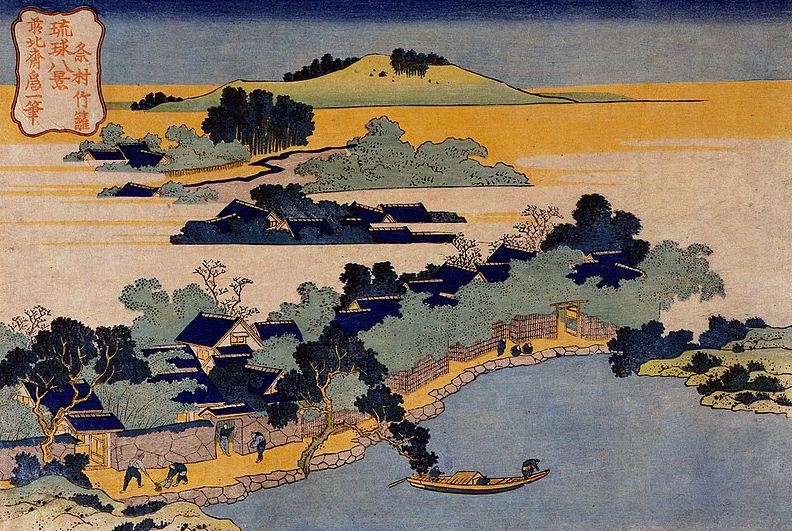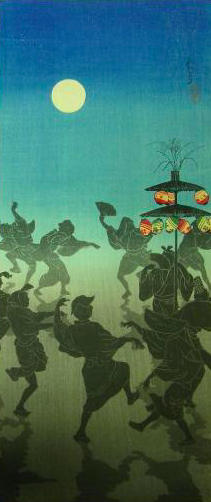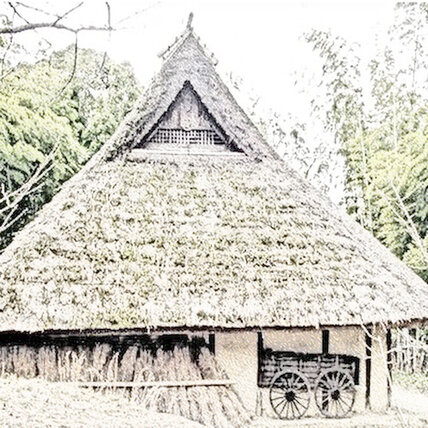In Okinawa
|
people build villages
of small secure houses, concrete, sometimes polished granite, with single low doors and porticoes, wide porches, which extend out generously into yards formed by low walls. All for the dead. The doorways, though small, are sufficient for urns of ash. The residents don’t use the doors nor have any of those protective lions on their roofs or at the gates. What are you going to do to the dead? They come out in the shade or lean against the courtyard walls. Having no substance, they can all stand in the same place at the same time, sharing a common vista—the tiny village, the stream, the valley. Together they hear the distant passing traffic and smell the far-off sea. |
Night Moon at Izumisaki by Hokusai c. 1832
|
|
Bon Festival Dance by Takahashi Shohei (1871-1945)
|
Bon-odori Dance
at a summer festival She’s rapt, with moonlight on her face, no costume, no plans beyond attending. She stops to watch the dance, the one about fishing—cast the net, push the oar, take three steps, now pull the line—then joins the group. They circle the stage under dangling lanterns, across the asphalt, past the murmuring generator and tinny speakers, deep in rhythm. For those mindful and lucky, some of this will linger. |
|
The Village of Praying Hands
Shirakawa-go, Ogun, Gifu Prefecture, August 2017 It is more a park than a place to live. Buses arrive at the edge of town and empty out tourists. The parking lot fills with cars. The Visitor Center dispenses maps and smiles, suggestions and directions. The few visible locals move through the day oblivious to the chattering groups who’ve come to stare, who walk among the thatched A-frame houses and perfect tiny rice fields. Chores are done, deals and deliveries made, gossip shared, all quietly, without much display. The reason for the village is lost. Maybe a band of religious ascetics found a safe, harsh haven to practice what they needed to do. More likely, the surviving losers of a clan war escaped to this canyon to scrape out a life. As they built they learned from loss: make the roofs steep. Aim the houses north, into the wind, like boats in a storm. Build them far apart so fire won’t spread. Remove the snow once a winter. Make stone walls on the small floodplains to create the paddies. Establish a shrine. Do all this together. Perhaps a traveler passing through, once a road was finally built, first called the houses gassho, “praying hands. Afternoon ends early here. Once the sun passes the ridge darkness comes quickly. The buses load up, the parking lot empties, the shops close. The few outsiders spending the night find their ways to inns. After dinner the village is silent, the roads unlit. Often storms come through, pounding the thatch, the cobbled paths, the gardens and the fields. In the morning the roofs steam in the sunlight as mists move through the mountainside trees. But imagine a clear night, the last full moon of summer, the house shapes glowing, the small yellow windows like candlelight reflections on praying hands. Perhaps Lao Tsu was thinking of a place like this when he wrote, ...their homes secure, they are happy in their ways. Though they live in sight of their neighbors, hear crowing cocks and barking dogs across the way, they leave each other in peace as they grow old and die. |
John Gribble is an American poet, musician, and mostly-retired English teacher. Originally from Southern California, he has been a Tokyo resident since 1993. He earned his MFA at Warren Wilson College and his work has appeared in journals and collections in the US, UK, Australia, Canada, and Japan. His books include Another Wrong Fedora, Ueno Mornings, and 100 Poets. One Song Each, a translation of the Ogura Hyakunin Isshu. He is co-organizer of both the Tokyo Writers Workshop and the Japan Writers Conference.
Use and/or duplication of any content on White Enso is strictly prohibited without express and written permission from the author and/or owner.
Proudly powered by Weebly


